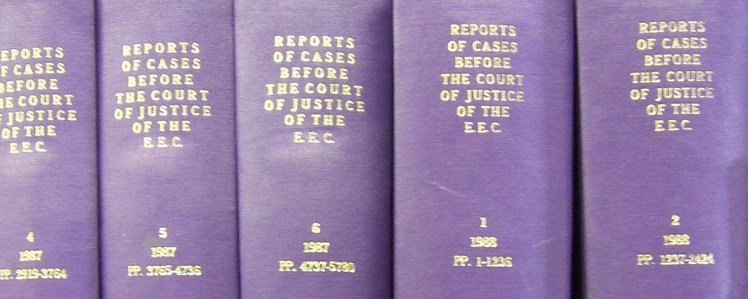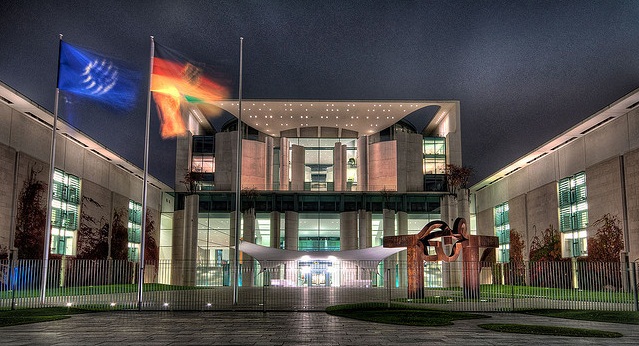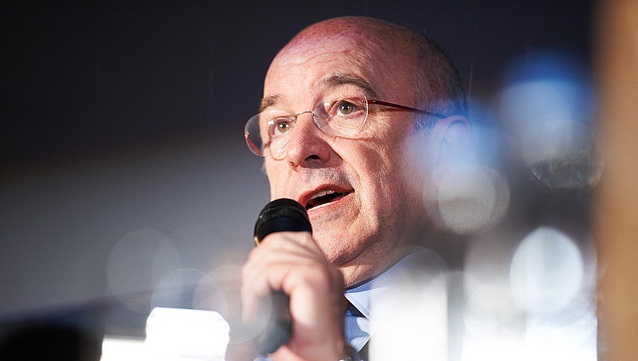Some days ago we reported on a press report basically saying that Munich has been dropped out of the hard fought race for the seat of the Central Division of the future EU Unified Patent Court:
[...] Munich seems to be out of the running, Paris appears to be the favourite and London could win a few laurels.
Paris as the court location appears to be backed by the President of the EU Council, Herman Van Rompuy, while it is speculated that
[t]he smart money appears to be on Paris at the moment, but diplomats warn that it’s still anyone’s guess whether a deal will be reached.
Now, on the eve of the decisive EU Summit, another article clarifies that Van Rompuy’s compromise plan, being the “result of consultation with the most concerned member states”, in fact proposes to share the location of the court between Paris, London and Munich. According to this plan, the official seat of the court’s central division, its president’s office and registry will reside in Paris, while some departments will be based in London and in Munich:
Given the highly specialised nature and quality standards, we also propose to create specialised clusters in two sections of the UPC, one in London, the other in Munich, which will continue to deal with administrative matters.
As the wording ‘administrative matters’ appears to exclude – for now – that court chambers will be established in London or Munich, one may ask what kind of administrative support can be given by Munich and London if even the registry is bound for Paris.
However, even though all these rumours cetrainly have a core of truth, it is also true that the race will not be decided by ‘smart money’ but by the EU Heads of Government on the EU Summit on 28/29 June 2012. It is further true that the outcome will highly depend on and be strongly linked to the much more important negitiations as to how the EU depth crisis can be effectively tackled. And this central issue will be dominated by the antagonism between the EU leaders who dramtically proposed a ‘Grand Plan‘ (pdf here) to safe the eurozone and Federal Chancellor Angela Merkel, who is prepared to rule out eurobonds “as long as I live“. Hence, there remains plenty of room for discussion and compromise – also on the seat issue.
(Photo 2009 by El Brown via Flickr under a CC license)
To answer the above question right away, I do not hope so because otherwise the future of the European Community/Union, the great idealistic and visionary European project, would lie in ruins already. As a patent professional and keen enthusiast of the European idea, please allow me to share some personal comments based on the findings of my earlier posting on the Deficiencies of the EU Legislative Process for Implementing a Unified Patent Infrastructure, namely
- ignorance as to users and experts and their (mostly) well-founded observations;
- a striking lack of transparency preventing public involvement;
- an information policy that disguises more than it discloses; and
- national egoisms, inappropriate horse-trading and power games.
As already expressed earlier, I think that these frightening mechanisms and structural deficiencies of the European policy-making process may endanger stability and acceptance of and confidence in the European Union as a whole. As none of those features is adequate for a democratic legislation process in a cooperating Europe, the conclusion might be that Europe’s democracy is in danger. This, apparently, is at least the opinion of Mr Martin Schultz, President of the European Parliament, who recently demanded that a “restart” of European democracy is required, as “the Union must make the decision-making process more transparent so that a genuine European public sphere can emerge”. Well roared, lion!
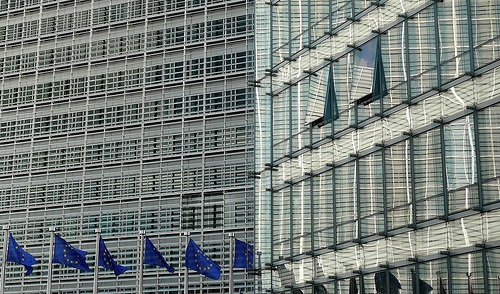
While some understand the 'Berlaymont' façade as symbol for a spirit of transparency, openness, and citizen involvement of EU policy making, others only recognise a good business for window wipers.
The epic and painful process of drafting and implementing a unified European patent infrastructure, which got stuck again on the latest Competitiveness Council meeting of 31 May/1 June 2012 (see our reports here and here as well as further coverage [1], [2]) discloses frightening mechanisms and structural deficiencies of the European policy-making process that may endanger stability and acceptance of and confidence in the European Union as a whole, particularly before the background of the current severe financial and depths crisis that shakes the Union like nothing else before.
Upon a closer look at the process, four major problems can be identified that prevent EU politicians to find a reasonable solution satisfying the needs of the European innovative economy:
- Ignorance as to users and experts and their mostly well-founded observations;
- A striking lack of transparency preventing public involvement;
- An information policy that disguises more than it discloses; and
- National egoisms, inappropriate horse-trading and power games.
Below I collect some striking examples of each of the above four phenomena.
Anti-Patent Campaigners put their trust in François Hollande as EU Council attends to Unitary Patent Court again

The newly elected President of France, François Hollande promising "change". Will he be the first anti-patent campaigner governing an EU state?
Now that François Hollande took office as the new President of France after his marginal victory in the French presidential elections this May, he will now introduce himself to official EU policy on his first Competitive Council meeting on May 31/June 1. The draft agenda for this meeting (cf. item 19), reading “Draft agreement on a Unified Patent Court and draft Statute – Political agreement“, electrifies observers of and parties involved the ongoing European patent legislation saga (see also press release, middle of page 5).
In recent months the upcoming French elections brought the negotiations on the Unified Patent Court Agreement to a complete standstill, as the dynamics between the French, British and German heads of govenment and the general political climate is a crucial factor in this legislative process, especially since the only serious and realistic candidates for the attractive seat of the new UPC Central Division are Paris, London, and Munich and it is frequently announced through official channels that this question is the only remaining open issue.
The EU Council expressed already in January this year its believe that a final agreement can be reached in June 2012 (see official statement) and it was the President of the European Council, Herman Van Rompuy, who clarified in a recent letter that he hopes (or expects) the remaining issues to be sorted out at next week’s Competitiveness meeting:
“[...] This deal is needed now, because this is an issue of crucial importance for innovation and growth. I very much hope that the last outstanding issue will be sorted out at the May Competitiveness Council. If not, I will take it up at the June European Council.”
But IP matters will not become easier in Europe with Mr Hollande, given his apparent openness to positions of critics of the current patent system. In fact, some of the answers (pdf) of Ms Fleur Pellerin (@fleurpellerin), responsible for the digital economy in Hollande’s campaign team, on a tendentious pre-election questionnaire of French anti software patent group “April” appear as if the socialist candidate for president (or his spokeswoman) was one of the ideological leaders of that pressure group:
The patentability of software would induce a partitioning of innovation that would be harmful to the ecosystem seen in its digital together. I am therefore opposed to the patenting of software.

The painting "Sonntag der Bergbauern" of Ernst Ludwig Kircher (1880-1938) is hanging above the cabinet table in the Berlin Office of the Federal Chancellor.
Recently, the Federal Ministry of Justice under Sabine Leutheuser-Schnarrenberger (Liberal Democrats/FDP, @sls_bmj) submitted a proposal for amendments to patent law and other laws of intellectual property (cf Draft Amendment, in German) that were approved this week by the Federal Cabinet. To enter into force, the Amendment still needs to be approved by the Federal Parliament (“Bundestag”) which, however, is only a formality given the present clear parliamentary majority.
The amendments to the Patent Act (Patentgesetz, PatG) aim at reducing bureaucracy and providing for more flexible and cost-efficient proceedings before the German Patent and Trademark Office (DPMA/GPTO), cf. press release (machine translation).
One important measure to improve cost- and procedural efficiency at least for the Office was the introduction of the electronic case file system ElSA which enables the GPTO to process patent and utility model files fully electronically. The present Amendment regulates inter alia the – long overdue – public access to the electronic ElSA files in order to provide for some cost- and procedural benefits to applicants and attorneys as well.
Articles 6 to 9 of the Unitary Patent Regulation relate to substantive patent law. They regulate the right to prevent direct and indirect use of the invention (Art. 6 and 7, respectively), the limitation of the effects of the ‘Unitary Patent‘ (Art. 8) and exhaustion of the rights conferred by the ‘Unitary Patent‘ (Art. 9).
As the question of which EU member state will receive the Central Division of the EU Unified Patent Court (see here, here, and here) is officially seen as the only remaining obstacle to the Unified Patent Court Agreement, the Unitary Patent Regulation already received green light from the EU Parliament’s legal committee (JURI) in late December (see press release) so that the EU Council already began to linguistically finalise the Regulation text in early January.
THE DISPUTE ON ARTICLES 6 TO 9
Even so, a strong and illustrious ‘opposition movement’ of legal professionals and their associations (e.g. EPLAW and Jochen Pagenberg, European Patent Judges and Sir Robin Jacob, Professor Krasser, CIPA), industry representatives (e.g. ICC, IP Federation), and a few politicians (e.g. JURI member Cecilia Wikström (SE, ALDE) [1, 2, 3] and UK IP Minister Baroness Wilcox) demanded Articles 6 to 8/9 to be removed from the Regulation to prevent substantive patent law from becoming subject to review by the European Court of Justice via referral questions according to Article 267 TFEU.
In one of our latest postings on the legal and political shadows of the Unified Patent Court Agreement we concluded that the stuck ‘seat issue’ will now have to be decided on the top executive level, i.e. in personal talks between Federal Chancellor Angela Merkel, Prime Minister David Cameron, and - should he survive the French presidential election in April/May 2012 - Nicolas Sarkozy as the only serious and realistic bits were Berlin, London, and Paris, respectively.
While the German government always claimed the seat of a European Patent Court, should such court ever exist, London became a candidate rather late and only after intervention of the UK legal profession and Paris was considered a compromise location to prevent a deadlock between Munich and London. None of these bits is ideal for everyone as each has considerable drawbacks, as has been recently summarised on FT.com “few other EU countries are happy with a Munich seat because the city is already the home to EPO“, “Britain lacks goodwill or allies“, and “French inflexibility has been damaging“.
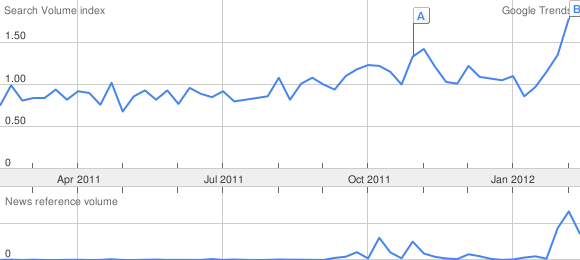
- Occurrence of the term “FRAND” in Google searches during the previous 12 months. In November 2011 (A) the EU Commission started investigations against Samsung due to possible infringement of FRAND conditions. In February 2012 (B) Google announced that the acquired Mororola patents will remain to be licensable under FRAND conditions.
In Part 1 of our series of two postings on political and business issues in the discussion on FRAND licensing in Europe, we sketched the EU Commission’s political approach towards maintaining free markets in times of standard-essential patents.
Now, in Part 2, we will have a closed look at what the various industry players in the ‘smartphone war’ say and do.
The ‘Smartphone War’: The significance of Mr Almunia’s agenda can be easily derived for the global patent conflict that initially started between Apple and Samsung and meanwhile, after months of infringement suits and injunctions, involves also essentially all other important Internet and mobile telco players such as Google, Motorola, Microsoft, Nokia and HTC. In an earlier posting we considered this to be a sort of stress test for the patent system as it currently is.
This is the first in a series of two postings – the second part will be published later today -, that relate to both the political and business attitude towards FRAND licensing in Europe. As there are two main players in that game, namely the EU Commission as the political market watch-dog and the Smartphone industry as patent holders and actors on these markets, we will first have a look at the political agenda of the EU Commission towards ensuring free market access in a world of standard-essential patents, as articulated in clear words only recently. In the light of the Commissions approach, the hint at the “Commission’s position as regulator-in-chief of the global technology industry”, as seen by the Financial Times back in 2007 , might never have been more true than today.
After months of intense debate in the EU Council and the EU Parliament’s Legal Affair’s Committee (JURI), the European Parliament was scheduled to have its fist plenary session on the EU Patent Package (Unitary Patent Regulation, Language Regime Regulation, Unified Patent Court Agreement) on coming Wednesday, 14 February 2012.
While Google Search still delivers an entry “Plenary sitting – European Parliament Tuesday, 14 February 2012 Draft agenda. 09:00 – 10:20 Debates. European patent. Creation of unitary patent protection.“, the final draft agenda now announces a Fisheries debate instead.
The k/s/n/h::law blog
Some of the patent attorneys of the KSNH law firm have joined their efforts to research what is going on in the various branches of IP law and practice in order to keep themselves, their clients as well as interested circles of the public up to date. This blog is intended to present results of such efforts to a wider public.
Blog Archives
- November 2013 (2)
- October 2013 (1)
- September 2013 (1)
- August 2013 (2)
- July 2013 (3)
- June 2013 (5)
- March 2013 (5)
- February 2013 (4)
- January 2013 (5)
- December 2012 (5)
- November 2012 (5)
- July 2012 (5)
- June 2012 (8)
- May 2012 (5)
- April 2012 (3)
- March 2012 (4)
- February 2012 (5)
- January 2012 (6)
- December 2011 (12)
- November 2011 (9)
- October 2011 (9)
- September 2011 (4)
- August 2011 (7)
- July 2011 (4)
- June 2011 (1)
Blog Categories
- business methods (6)
- EPC (7)
- EPO (12)
- EU law (92)
- ACTA (8)
- CJEU (4)
- Comitology (1)
- competition law (2)
- Enforcement (6)
- EU Unified Patent Court (62)
- FTA India (1)
- TFEU (2)
- Trade Marks (5)
- European Patent Law (37)
- German Patent ACt (PatG) (1)
- German patent law (5)
- Germany (6)
- Pirate Party (3)
- International Patent Law (4)
- PCT (2)
- IP politics (10)
- licenses (2)
- Litigation (5)
- Patentability (7)
- Patents (12)
- Piratenpartei (2)
- Software inventions (10)
- Uncategorized (9)
- Unitary Patent (24)
- US Patent Law (4)
Comments
- kelle on Germany: Copyright Protection More Easily Available For Works Of “Applied Arts”
- Time Limits & Deadlines in Draft UPCA RoP: Counting The Days - KSNH Law - Intangible.Me on Wiki Edition of Agreement on Unified Patent Court Agreement (UPCA)
- Time Limits & Deadlines in Draft UPCA RoP: Counting The Days | ksnh::law on Wiki Edition of Agreement on Unified Patent Court Agreement (UPCA)
- Wiki Edition of Agreement on Unified Patent Cou... on Wiki Edition of Agreement on Unified Patent Court Agreement (UPCA)
- European Commission Takes Next Step Towards Legalising Software Patents in Europe | Techrights on EU Commission publishes Proposal of amendend Brussels I Regulation for ensuring Enforcement of UPC Judgements
Blogroll
- 12:01 Tuesday
- America-Israel Patent Law
- Anticipate This!
- AwakenIP
- BlawgIT
- BLOG@IPJUR.COM
- BP/G Radio Intellectual Property Podcast
- Broken Symmetry
- Class 46
- Director's Forum: David Kappos' Public Blog
- Gray on Claims
- I/P UPDATES
- IAM Magazine Blog
- Intellectual Property Intelligence Blog
- IP Asset Maximizer Blog
- IP CloseUp
- IP Dragon
- IP Watch
- IP Watchdog
- IPBIZ
- ipeg
- IPKat
- ITC 337 Law Blog
- Just a Patent Examiner
- K's Law
- MISSION INTANGIBLE
- Patent Baristas
- Patent Circle
- Patent Docs
- Patently Rubbish
- PatentlyO
- Patents Post-Grant
- Reexamination Alert
- SPICY IP
- Tangible IP
- The 271 Patent Blog
- The Intangible Economy
- THE INVENT BLOG®
- Think IP Strategy
- Tufty the Cat
- Visae Patentes
The KSNH blogging landscape


This blog and the German-language sister blog k/s/n/h::jur link to the two popular and privately run blogs IPJur und VisaePatentes and continue their work and mission with a widened scope and under the aegis of our IP law firm.
ksnhlaw on Twitter
- No public Twitter messages.
 KSNH::JUR Feed (german)
KSNH::JUR Feed (german)- Ist Verschlüsselung passé? September 6, 2013Auf verschiedenen Feldern beruflicher Praxis ist dafür zu sorgen, dass Kommunikation vertraulich bleibt. Die trifft beispielsweise für Ärzte zu, aber auch für Anwälte, darunter auch Patentanwälte. Einer der zahlreichen Aspekte, die in diesem Zusammenhang eine Rolle spielen, ist die Technik, um die Vertraulichkeit beruflicher Kommunikation sicherzustellen. Wa […]
- EU-Einheitspatent: Demonstrativer Optimismus und Zahlenmystik allerorten – Naivität oder politische Beeinflussung? June 26, 2013Nach mehreren vergeblichen Anläufen zur Schaffung eines EU-weiten Patentsystems wurde 1973 als Kompromiss das Europäische Patentübereinkommen unterzeichnet, welches unabhängig von der seinerzeit noch EWG genannten Europäischen Union System zur zentralisierten Patenterteilung mit nachgeordnetem Einspruchsverfahren durch das Europäische Patentamt schuf. Wie wi […]
- Moderne Zeiten oder: DPMA und Patentgericht streiten über die elektronische Akte April 25, 2013Bekanntlich hat das Deutsche Patent- und Markenamt (DPMA) im Jahre 2013 mit der rein technischen Fertigstellung der Einrichtungen zur elektronischen Akteneinsicht einen wichtigen Meilenstein seines Überganges von der Papierakte zur “elektronischen Akte” erreicht. Im DPMA werden aber bereits seit dem 01. Juni 2011 Patente, Gebrauchsmuster, Topografien und erg […]
- Gutachten zu Forschung, Innovation und technologischer Leistungsfähigkeit Deutschlands 2013 March 11, 2013Unter dem Datum vom 28. Februar 2013 ist die Bundestags-Drucksache 17/12611 veröffentlicht worden Sie trägt den Titel Unterrichtung durch die Bundesregierung - Gutachten zu Forschung, Innovation und technologischer Leistungsfähigkeit Deutschlands 2013. Die Bundesregierung legt dem Deutschen Bundestag seit dem Jahr 2008 […]
- 3D-Printing: Zum Filesharing von 3D-Modelldaten February 25, 2013In meiner kleinen zuvor angekündigten Reihe über rechtliche Aspekte des 3D Printing komme ich heute auf die Frage zu sprechen, ob die Hersteller von Gerätschaften es hinnehmen müssen, wenn Ersatztreile davon – vom Brillengestell über Smartphone-Gehäuseteile bis hin zu Rastenmähermotor-Abdeckungen – gescannt und die daraus […]
- Ist Verschlüsselung passé? September 6, 2013



